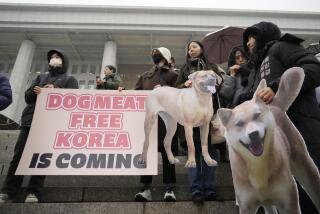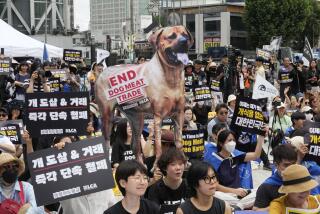In S. Korea, Rice defends U.S. beef
SEOUL — America’s chief diplomat found herself vouching for the purity of U.S. cattle Saturday, wading into a bitter trade dispute that for South Koreans has eclipsed the long-running drama over North Korea’s nuclear activity and threatened the government of President Lee Myung-bak.
Just one day after the communist North demolished the most visible symbol of its nuclear programs, Secretary of State Condoleezza Rice faced a barrage of questions about the safety of American steaks, chops and burgers. She had told reporters she hoped this issue would not distract from other matters.
“I want to assure everyone that American beef is safe,” she said at a news conference with South Korea’s foreign minister, Yu Myung-hwan. “We will continue to work with you to have consumer confidence in that matter. We want there to be consumer confidence in American beef.”
But Yu said the beef issue probably would not go away quickly.
“It will take time for that risk to be erased from the minds of the Korean public,” he said.
For many South Koreans, who have lived with threats from their neighbor for five decades, the nuclear issue is of less concern than is Seoul’s agreement to lift a ban on American beef imports in April as a way to restore strained ties with Washington.
Activists have staged daily rallies in the capital to voice fears about possible health risks such as mad cow disease. As officials began inspecting U.S. beef Friday before it can reach markets, hundreds of labor activists blocked customs storage facilities.
About 15,000 people staged another rally Saturday in Seoul, clashing with riot police who stopped them from marching into the presidential Blue House, according to police.
Protesters wielded steel pipes and threw stones at riot police who used water cannons and fire extinguishers to repel them, police said.
Police said they had arrested more than 50 protesters on charges of beating riot police and illegally occupying streets. Hundreds of riot police and protesters were injured during the rally that continued until early this morning, according to media reports.
U.S. beef was banned for most of the last 4 1/2 years, after the first case of mad cow disease in the U.S. was discovered in late 2003.
In the wake of public outrage over plans to resume shipments of American beef, the South Korean Cabinet has offered to resign and the president has reshuffled top advisors.
Seoul agreed to resume U.S. beef imports only after American producers said they would limit shipments to meat from cattle younger than 30 months. These animals are believed less susceptible to mad cow disease. The restriction was considered a transitional step that will be lifted when conditions change in South Korea.
More to Read
Sign up for Essential California
The most important California stories and recommendations in your inbox every morning.
You may occasionally receive promotional content from the Los Angeles Times.










